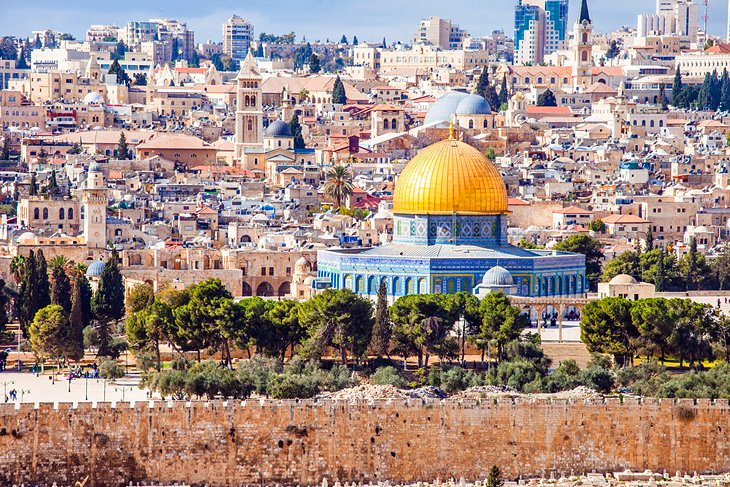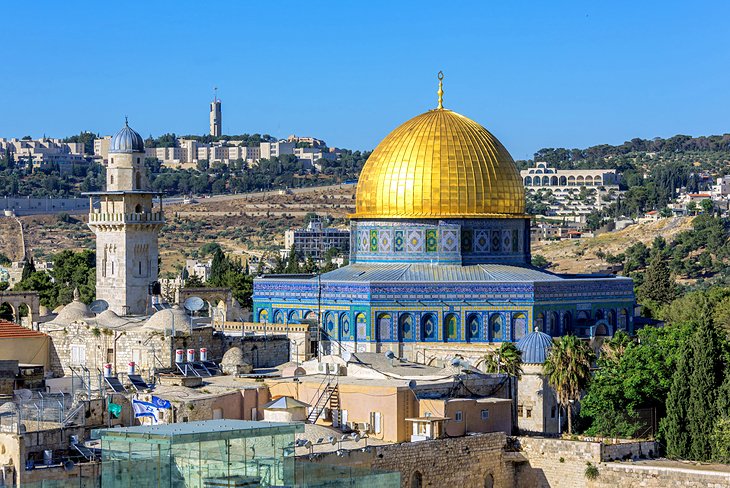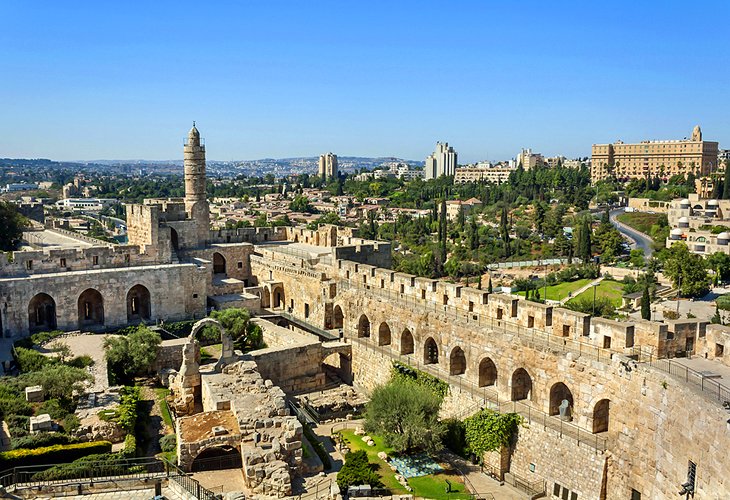
Israel, a land steeped in millennia of history, spiritual significance, and breathtaking natural beauty, offers an unparalleled travel experience. From the ancient stones of Jerusalem to the modern beaches of Tel Aviv, the serene landscapes of the Galilee to the stark majesty of the Dead Sea, this small nation packs an extraordinary punch. It’s a destination where history is alive, faith resonates in every corner, and innovation thrives amidst timeless traditions. Prepare for an unforgettable journey through a land that profoundly shapes the world, past and present.
Top Attractions: Where History, Faith, and Nature Converge
Israel’s compact size belies the sheer diversity and density of its must-see attractions. Each region offers a unique flavor, promising something for every traveler.

Related Articles about Israel: A Journey Through Ancient Wonders and Modern Vibrancy:
- Santiago: A Symphony of Peaks and Culture – Your Guide to the City’s Finest Stays and Sights
- Egypt: A Journey Through Timeless Wonders
- Brazil: A Symphony of Sights, Sounds, and Sensations
- Penang: The Pearl of the Orient – A Comprehensive Guide to its Charms
- Venice: A Labyrinth of Wonders, History, and Unforgettable Experiences
Jerusalem: The Eternal City
At the heart of Israel lies Jerusalem, a city revered by billions, where three Abrahamic faiths converge. Its very air hums with ancient stories and spiritual devotion.
-
The Old City: Enclosed within magnificent walls, Jerusalem’s Old City is a UNESCO World Heritage site divided into four quarters: Jewish, Christian, Armenian, and Muslim.
- The Western Wall (Kotel): The holiest site where Jews are permitted to pray, it’s a profound experience to witness or participate in the fervent prayers offered here. The ancient stones whisper tales of resilience and faith.
- Church of the Holy Sepulchre: For Christians, this is the most sacred site, believed to encompass both the site of Jesus’ crucifixion (Calvary or Golgotha) and his empty tomb. Its labyrinthine chapels and ancient atmosphere are deeply moving.
- Dome of the Rock and Al-Aqsa Mosque (Temple Mount/Haram al-Sharif): Dominating the Old City skyline, the shimmering golden Dome of the Rock is an architectural marvel and one of Islam’s holiest sites. Non-Muslims can typically visit the exterior during specific hours, offering a glimpse into its stunning tilework and intricate designs.
- Via Dolorosa: Walk the traditional path Jesus took to his crucifixion, marked by fourteen Stations of the Cross, each telling a part of the biblical narrative.
- Mahane Yehuda Market (The Shuk): Outside the Old City, this bustling market is a sensory explosion of sights, sounds, and smells. Fresh produce, spices, baked goods, and an array of eateries make it a vibrant hub, especially lively in the evenings.

-
Mount of Olives: Offering breathtaking panoramic views of the Old City, the Mount of Olives is home to ancient cemeteries and several significant churches, including the Garden of Gethsemane, where Jesus prayed before his arrest.
-
Yad Vashem: Israel’s official memorial to the victims of the Holocaust is a profoundly moving and essential experience. Its powerful exhibits, Hall of Names, and Children’s Memorial serve as a solemn reminder of history’s darkest chapter and a testament to human resilience.
-
Israel Museum: Home to the Dead Sea Scrolls, the Shrine of the Book, and an extensive collection of art and archaeological artifacts spanning millennia, the Israel Museum is a treasure trove for history and culture enthusiasts.
Tel Aviv: The Mediterranean Metropolis
In stark contrast to Jerusalem’s ancient gravitas, Tel Aviv is a vibrant, modern, and cosmopolitan city, often dubbed the "Non-Stop City."
- Beaches: Tel Aviv boasts a stunning coastline with pristine sandy beaches. From Gordon Beach to Frishman Beach, they are perfect for sunbathing, swimming, paddleboarding, or simply soaking in the lively atmosphere.
- Jaffa (Yafo): One of the world’s oldest port cities, ancient Jaffa is now seamlessly integrated into modern Tel Aviv. Explore its charming alleyways, art galleries, flea market, and picturesque harbor, offering fantastic views of Tel Aviv’s skyline.
- Bauhaus Architecture: Tel Aviv is a UNESCO World Heritage site thanks to its "White City" — the world’s largest collection of Bauhaus-style buildings, reflecting the city’s early 20th-century architectural heritage.
- Carmel Market (Shuk Ha’Carmel): Similar to Mahane Yehuda, this bustling market offers a fantastic array of food, clothing, and local goods, providing a true taste of Israeli street life.
- Nightlife and Culinary Scene: Tel Aviv is renowned for its dynamic nightlife, chic bars, and world-class restaurants, reflecting its status as a global culinary hotspot.
The Galilee Region: Biblical Landscapes and Natural Beauty
To the north, the Galilee is a lush, green region central to Christian pilgrimage, known for its biblical sites and stunning natural beauty.
- Sea of Galilee (Lake Kinneret): Israel’s largest freshwater lake is surrounded by sites central to Jesus’ ministry.
- Capernaum: Often called "Jesus’ own town," Capernaum features the ruins of an ancient synagogue and a church believed to be built over St. Peter’s house.
- Tabgha: The traditional site of the multiplication of loaves and fishes, marked by a beautiful Byzantine church with stunning mosaic floors.
- Mount of Beatitudes: Overlooking the Sea of Galilee, this serene hill is the traditional site where Jesus delivered the Sermon on the Mount.
- Nazareth: The largest Arab city in Israel and Jesus’ childhood home, Nazareth is dominated by the magnificent Basilica of the Annunciation.
- Safed (Tzfat): A charming, mystical city nestled in the hills, Safed is one of Judaism’s four holy cities and a center for Kabbalah (Jewish mysticism). Its narrow, winding alleyways are filled with artists’ galleries and ancient synagogues.
The Dead Sea Region: Lowest Point on Earth
Southeast of Jerusalem lies the unique landscape of the Dead Sea, the lowest point on Earth, a natural wonder known for its therapeutic properties.
- The Dead Sea: Float effortlessly in the hypersaline waters, a truly surreal and rejuvenating experience. Slathering yourself in the mineral-rich mud is a must for its skin benefits.
- Masada: A UNESCO World Heritage site, this ancient fortress atop an isolated rock plateau tells a heroic and tragic tale of Jewish rebels who defied the Roman Empire. The views at sunrise, whether reached by cable car or a challenging hike up the Snake Path, are unforgettable.
- Ein Gedi Nature Reserve: A lush oasis nestled against the stark desert landscape, Ein Gedi features beautiful waterfalls, natural pools, and diverse wildlife, offering a refreshing break from the arid surroundings.
Eilat: Red Sea Resort Town
At Israel’s southernmost tip, Eilat is a vibrant resort city on the Red Sea, famous for its coral reefs, marine life, and desert adventures.
- Coral Beach Nature Reserve: A protected underwater park offering some of the world’s most spectacular snorkeling and diving, with vibrant coral formations and an abundance of tropical fish.
- Dolphin Reef: A unique ecological site where you can observe dolphins in their natural habitat, and even swim or dive alongside them.
- Timna Park: Just north of Eilat, this geological wonderland features stunning copper mines, unique rock formations like Solomon’s Pillars, and ancient petroglyphs, all set against a dramatic desert backdrop.
Other Notable Historical Gems
- Caesarea National Park: On the Mediterranean coast between Tel Aviv and Haifa, Caesarea boasts impressive Roman and Crusader ruins, including a well-preserved amphitheater, hippodrome, and a stunning aqueduct by the sea.
- Acre (Akko): Another UNESCO World Heritage site, Akko is an ancient port city with a rich Crusader history. Explore its underground Crusader city, Ottoman-era fortresses, and bustling souks.
A Tapestry of History: Millennia in the Making
Israel’s history is as layered as the archaeological digs that constantly unearth its past. From the earliest human settlements to the modern state, this land has been a crucible of civilizations, religions, and empires.
The story begins over 3,000 years ago with the biblical patriarchs, leading to the formation of the ancient Israelite kingdoms under figures like King David and King Solomon, whose legacies are profoundly felt in Jerusalem. Following periods of division and foreign domination, including by the Assyrians, Babylonians, and Persians, the land saw the rise of Hellenistic and Roman rule. It was under Roman occupation that Jesus lived and preached, making the land central to Christianity.
After the Roman destruction of the Second Temple in 70 CE and subsequent Jewish revolts, the Jewish people were largely dispersed. The land then passed through Byzantine, Arab, Crusader, Mamluk, and Ottoman hands, each leaving their architectural, cultural, and religious imprint. The Ottoman Empire ruled for 400 years until World War I, when the British Mandate was established.
The 20th century witnessed the Zionist movement’s efforts to re-establish a Jewish homeland, culminating in the declaration of the State of Israel in 1948. This modern history is complex, marked by conflicts and a remarkable journey of nation-building, transforming a desert landscape into a thriving hub of technology and culture, while continuously grappling with its ancient heritage and regional challenges. Today, Israel stands as a vibrant democracy, a testament to enduring faith and human perseverance.
Navigating Your Journey: Essential Travel Tips
Traveling to Israel is generally safe and incredibly rewarding, but a few practical tips will enhance your experience.
- Safety and Security: Israel has robust security measures. Be prepared for security checks at airports, hotels, and some public places. Always carry your passport. While generally safe, be aware of your surroundings and follow local advice.
- Dress Code: While Tel Aviv is very liberal, modesty is appreciated, and often required, in religious sites (Jerusalem, Safed). Pack layers, and bring scarves for women to cover shoulders/knees when visiting holy places.
- Language: Hebrew and Arabic are the official languages, but English is widely spoken, especially in tourist areas. Learning a few basic Hebrew phrases like "Shalom" (hello/peace) and "Toda" (thank you) will be appreciated.
- Currency: The New Israeli Shekel (NIS) is the official currency. Credit cards are widely accepted, and ATMs are readily available.
- Visa Requirements: Most Western citizens (US, Canada, UK, EU, Australia, etc.) do not require a visa for tourist stays up to 90 days. Always check the latest visa requirements for your nationality before traveling.
- Shabbat: From Friday sundown to Saturday sundown, Shabbat is observed. Public transportation largely stops, many businesses close, and a sense of calm descends. Plan your itinerary accordingly, especially if traveling during this period.
- Hydration and Sun Protection: Israel can be very hot, especially from May to September. Drink plenty of water, wear a hat, sunglasses, and high-SPF sunscreen.
- Photography: Be respectful when photographing people, especially in religious areas. Always ask for permission.
- Tipping: Tipping 10-15% is customary in restaurants and for tour guides.
Where to Stay: Accommodation Options
Israel offers a wide range of accommodation to suit every budget and travel style.
- Luxury Hotels: Major cities like Tel Aviv and Jerusalem boast world-class luxury hotels, often with stunning views, spas, and gourmet dining.
- Boutique Hotels: Increasingly popular, these offer unique designs, personalized service, and often a more intimate atmosphere, especially in Tel Aviv and Jaffa.
- Hostels: Excellent, clean, and modern hostels are available in all major tourist hubs, perfect for budget travelers and solo adventurers looking to connect with others.
- Guesthouses (Zimmers): Particularly popular in rural areas like the Galilee, Zimmers offer cozy, often rustic, private accommodations, sometimes with amenities like jacuzzis.
- Kibbutz Guesthouses: Experience a unique aspect of Israeli life by staying in a guesthouse on a kibbutz (collective community). Many offer comfortable rooms, meals, and a glimpse into communal living.
- Airbnb/Apartment Rentals: A great option for longer stays or for groups, providing more space and flexibility, especially in cities.
Getting Around: Transportation
Navigating Israel is relatively easy thanks to a well-developed infrastructure.
- Inter-city Buses: Egged and Dan are the main bus companies, offering extensive routes connecting most cities and towns. It’s an affordable and efficient way to travel.
- Trains: Israel Railways connects major cities like Tel Aviv, Jerusalem, Haifa, and Beer Sheva. It’s often faster and more comfortable than buses for these specific routes.
- Within Cities:
- Buses: Comprehensive bus networks operate within cities.
- Light Rail: Jerusalem has an efficient light rail system, connecting key areas. Tel Aviv is developing its own.
- Taxis: Readily available in all cities. Use metered fares or agree on a price beforehand. Ride-sharing apps like Gett (local) and Uber are also active.
- Walking: Many cities, especially the Old City of Jerusalem and central Tel Aviv, are best explored on foot.
- Car Rental: Renting a car offers maximum flexibility, especially for exploring the Galilee, Negev Desert, or Dead Sea region. Roads are well-maintained, but driving in major cities can be challenging, and parking can be expensive. Be aware of varying road conditions and security zones if planning to drive into the West Bank.
When to Visit: Best Time of Year
Israel experiences a Mediterranean climate, with hot, dry summers and mild, wet winters. The best time to visit largely depends on your priorities.
- Spring (March to May): Widely considered the ideal time. Temperatures are pleasant (20-28°C / 68-82°F), wildflowers are in bloom, and the landscapes are green. Perfect for sightseeing, hiking, and exploring.
- Autumn (September to November): Another excellent period. The intense summer heat subsides, and the weather remains warm and comfortable (25-30°C / 77-86°F). The sea is still warm enough for swimming.
- Summer (June to August): Very hot, especially inland and in the south (Dead Sea, Eilat, Negev), with temperatures often exceeding 35°C (95°F). This is peak season for beaches and Red Sea activities but can be challenging for extensive sightseeing.
- Winter (December to February): Mild with occasional rain, especially in the north and center. Jerusalem can get chilly, and even experience rare snowfall. The south (Eilat, Dead Sea) remains pleasantly warm and is a great escape from colder European winters. This is a good time for cultural tours without the crowds.
Consider Jewish holidays (Passover, Sukkot, Rosh Hashanah) as prices for flights and accommodation can increase, and some services might be limited. However, experiencing these holidays can also be a deeply enriching cultural experience.
Conclusion
Israel is more than just a travel destination; it’s an experience that engages all senses and touches the soul. It’s a land where ancient history breathes alongside vibrant modernity, where diverse cultures coalesce, and where every stone seems to tell a story. Whether you’re seeking spiritual enlightenment, historical insights, thrilling adventures, or simply a sun-soaked escape, Israel promises a journey filled with discovery, wonder, and unforgettable memories. Prepare to be captivated by its enduring charm and profound significance.





